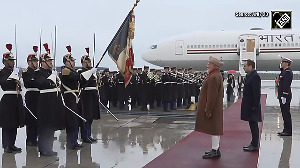Anti-HIV/AIDS vaccine will be available in the country within the next three years and its clinical trial is on, President A P J Abdul Kalam said on Friday. "Hopefully in three years, it will be available in the market," he told a conclave on 'HIV/AIDS: A uniformed intervention', organised by Assam Rifles Wives Welfare Association
Kalam said he had a talk with the union health minister in this regard. The President asked the Assam Rifles not to be cowed down by incidents of HIV/AIDS in its ranks and, instead, inculcate an indomitable spirit to defeat the disease.
There were 139 instances of HIV/AIDS, including 40 deaths in the security force, he said and asked ARWWA to conduct regular training programmes for the jawans to prevent future cases. He also suggested the association to get in touch with the directorate general of Armed Forces Medical Services to get good doctors for training purposes.
He dwelt at length how Asha Ramaiya, a HIV patient since 1995, whom he met at Bangalore in August, was overcoming all odds in her life with her indomitable spirit to fight the disease and the stigma attached to it, he said.
"As human beings, we may get into the problems. But we should not get defeated by the problem," he said reciting two Tamil couplets to stress on a vision of the future and to master the situation.
President Kalam, who is on his second visit to Meghalaya, met some HIV-affected children immediately after arriving at the North Eastern Council Secretariat, the venue of the conclave. He was delayed by over four hours due to bad weather at Gangtok, where he had stayed for the night.
Addressing the gathering, Union DONER Minister P R Kyndiah said the north east has numerous problems of socio-economic development. "We are determined to face these challenges unitedly and convert them into opportunities for growth," he said.
Kyndiah said the National Common Minimum Programme of the United Progressive Alliance government at the Centre has committed to raise the public spending on health to at least 2-3 percent of GDP over the next five years with focus on primary health care.
The National AIDS control project being implemented by the National AIDS Control Organisation is aimed at enhancing India's capacity to fight the disease on a long-term basis. NACO proposed to set up anti-discrimination units in all the 38 AIDS control societies in the states and union territories, he said.
"Our national AIDS prevention and control policy envisaged stemming the tide by 2007 targeting to achieve zero level of new AIDS infections by that year," he added.
Meghalaya Governor M M Jacob said the armed forces and security personnel posted in the north east were more vulnerable to sexually transmitted infections during peace times compared to their civilian counterparts.
Drugs coming from the 'Golden Triangle' were entirely consumed by the people in the region which put the jawans at great risk. Chief Minister D D Lapang and ARWWA President Winnie Singh also spoke on the occasion.






 © 2025
© 2025